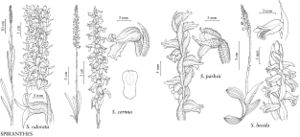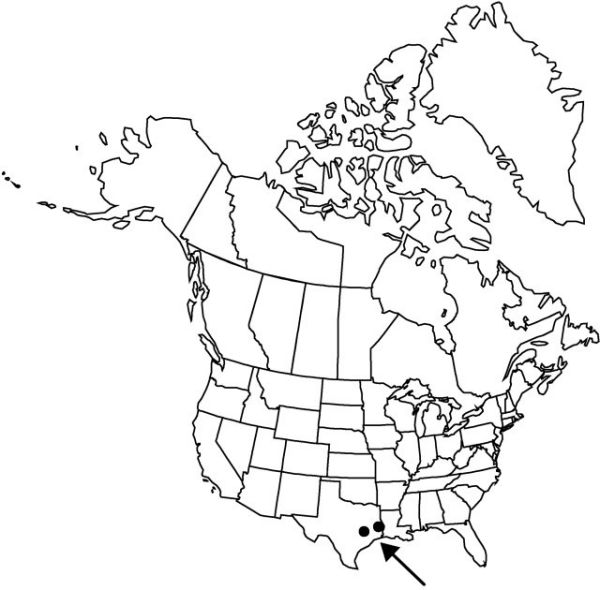Spiranthes parksii
Amer. Orchid Soc. Bull. 16: 400, figs. 1–6. 1947.
Plants 15–33 cm. Roots few, spreading to descending, slender to somewhat tuberously thickened, mostly to 0.8 cm diam. Leaves fugaceous, basal, ascending to spreading, linear-lanceolate to somewhat broader. Spikes loosely spiraled, usually 5 flowers per cycle of spiral; rachis moderately to densely pubescent, some trichomes capitate, glands obviously stalked. Flowers horizontal to ascending, white to pale yellowish green, scarcely gaping, urceolate-tubular; sepals distinct to base, 5–8 mm; lateral sepals directed nearly forward, apex straight or apical 1–2 mm curved upward; petals whitish to yellow-green with longitudinal central green stripe, ovate, obovate, or suborbiculate, 4.5–6.7 mm, apex obtuse to emarginate-erose; lip centrally yellow to yellowish or greenish white, ovate to ovate-oblong, 5–7 × 3.8–4.9 mm, apex truncate, obtuse to deeply emarginate, erose-crisped, glabrous; veins several, branches parallel; basal calli incurved to elongate, prominent; viscidia linear-lanceolate; ovary 4–6 mm. Seeds partly or wholly polyembryonic. 2n = 60.
Phenology: Flowering Oct–Nov.
Habitat: Dry open to lightly shaded sites in post-oak savanna
Elevation: 100 m
Discussion
Of conservation concern.
The tetraploid chromosome number and apomictic development of polyembryonic seeds indicate that Spiranthes parksii is a member of the S. cernua complex. The broad petals with central green stripe, several veins (instead of the three typical of the group), and erose-emarginate apical margin furthermore evidently represent partial peloria. Peloria is common in S. cernua, especially in the prairies, although in most cases it involves the suppression of the lip rather than the elaboration of the petals to a condition approximating the lip, as is the case in S. parksii. With a very limited distribution in east-central Texas, S. parksii might therefore represent merely a local, minor form of S. cernua. Other characteristics, however, including the small flower size and often upturned lateral sepal apices, lie outside the normal range of variation in S. cernua and suggest that the plants represent a distinct species.
Selected References
None.

